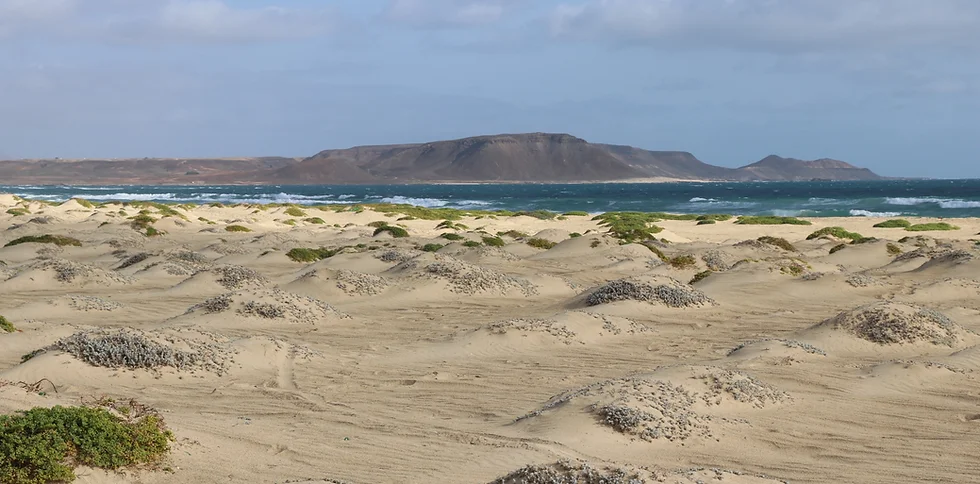Deadline: 26-Jul-24
The US Department of State's Embassy in Praia announces an open call for organisations to submit applications for a project to improve Cape Verde's climate resilience and adaptability by implementing comprehensive dune restoration strategies.
Programme target
- At the end of the performance period, the project will strengthen climate resilience and adaptability by completing dune restoration strategies in the selected area and implementing awareness-raising about the ecological significance of dunes and sustainable ecotourism practices.
Programme objectives
- Objective 1: Implement sustainable dune restoration techniques: Defend the use of evidence-based sustainable practices to safeguard biodiversity and stop erosion.
- Objective 2: Integrate ecotourism: Helping to boost localised climate adaptation projects, promoting the integration of sustainable ecotourism as a development tool economic .
- Objective 3: Strengthening capacity and awareness: Develop local knowledge and leadership and raise awareness of the ecological importance of dunes through educational initiatives, leading to policy changes at central and municipal level.
Information on financing
- Total estimated funding for the programme: US$ 100,000
- Premium Ceiling: US$ 100,000
- Premium Floor: US$ 80,000
- Number of prizes: one
- Period of operation: Two years. The planned implementation period for this grant will be from January 2025 to December 2027.
expected results
- The expected results of the project should include at least:
- Result 1: Launch dune restoration techniques, laying the foundations for subsequent initiatives in Cape Verde.
- Result 2: Improve capacity at local and national level to carry out dune restoration projects.
- Result 3: Raising awareness and involving the local population in the value of coastal dunes for preventing flooding and conserving biodiversity.
Activities
- The detailed activities must be proposed by the applicants and include references to partnerships that the applicant will establish with relevant government entities, both at central and local level, as well as with other interested parties. These activities should include, as a minimum:
- Forging technical partnerships to ensure the successful implementation of dune restoration projects.
- Formulate a green belt plan to regulate visitor and vehicle access in crucial dune regions, adhering to best practices.
- Design and implement cost-effective dune restoration strategies, not using invasive plants for dune restoration, but prioritising the recovery of native species.
- Organise a workshop for Protected Area managers and conservation groups, passing on knowledge from dune restoration experts.
- With specialised assistance, create adaptable protocols and guidelines to start dune restoration projects.
- Establish an interpretive trail within a restoration site, complete with educational signage detailing the restoration process and its significance.
- Produce and distribute an educational video, complemented by content media to increase understanding and support for efforts to preserve the dunes.
Performance indicators
- Adaptation Indicators:
- Number of people trained in climate change adaptation supported by the project (US Government assistance).
- Number of institutions with improved capacity to assess or address climate change risks supported by the project (US Government assistance).
- Number of people supported by the project (US government assistance) to adapt to the effects of climate change.
- Number of people using climate information or implementing risk reduction actions to improve resilience to climate change, as supported by the project (US Government assistance)
- Key indicators:
- Number of hectares with improved management.
- Area of land or habitat under restoration in hectares.
- Number of people with improved capacity.
- Number of information panels put up informing about the restoration project.
Participants and public
- The main beneficiaries of the project are the local populations in the targeted areas. Given the project's awareness-raising component, it is hoped that there may be positive effects at national level, since greater access to information means that more people will benefit from the project's implementation than initially anticipated.
Priority region
- Project activities will be implemented in Cape Verde. Proposals must prioritise high-value tourist sites and specify specific areas where restoration work can be completed within the available budget and within the planned implementation period.
Election criteria
- Eligibility is limited to the entities listed below, Cape Verdean or non-Cape Verdean, with relevant Cape Verdean experience in the area(s) targeted by the project:
- Non-profit organisations, including conservation think tanks and civil society/non-governmental organisations.
For more information, visit Grants.gov .


